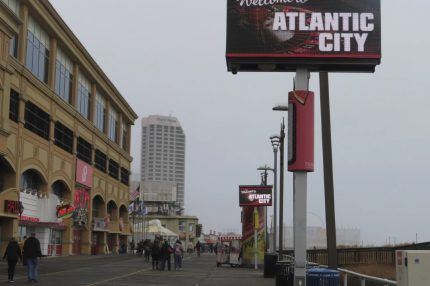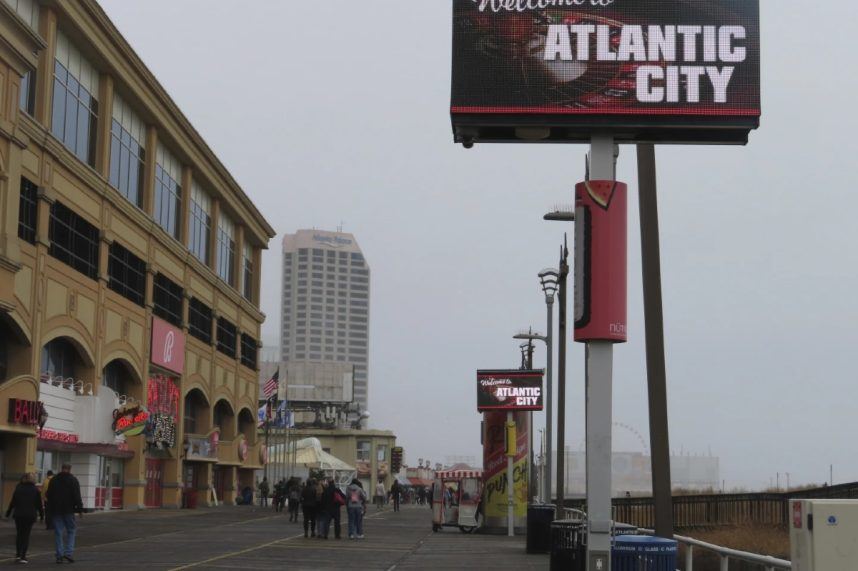Atlantic City Casino Revenue Starts 2024 Slow, Gaming Win Down Three Percent

Posted on: February 16, 2024, 04:02h.
Last updated on: February 16, 2024, 04:05h.
Atlantic City casinos got off to a cold start in 2024, as January brick-and-mortar gross gaming revenue (GGR) dipped more than 3%.

Retail slot machines and table games at the nine casinos totaled $205 million, 3.1% less than January 2023 when the resorts won nearly $211.7 million. Slot machines were the culprit, as the terminals saw their hold tumble almost 6% to $143 million. Table win was up almost 4% to $62 million.
Still, January’s legacy play represented the second-best January result in 11 years, said James Plousis, chair of the New Jersey Casino Control Commission.
While brick-and-mortar play slowed in January, iGaming and sports betting continued to shine.
Online slot machines and table games won a record $180.8 million — a 20% year-over-year increase. Online poker rake was $2.5 million.
Oddsmakers took over $1.7 billion in bets and kept $170.7 million of the wagers on an impressive 10% hold. Sports betting in New Jersey is operational online and at Atlantic City casinos and three state horse racetracks. The January revenue won by sportsbooks represented a 136% year-over-year surge.
All combined, New Jersey GGR in January jumped 28% to $559 million.
Different Starts
New Jersey gaming revenue hit a record $5.77 billion last year. Online slots and table games reached an all-time high of $1.92 billion. Sports betting revenue, most of which is facilitated over the internet, went upwards of $1 billion for the first time.
While iGaming and oddsmakers enjoyed record years, the physical casinos didn’t fare too bad, either. The nine casinos won over $2.84 billion — a 2.2% year-over-year premium.
A new report this week caused many headlines claiming that iGaming doesn’t cannibalize land-based casino revenue. Researchers at Eilers & Krejcik Gaming carried out the study commissioned by iDEA, the iDevelopment and Economic Association, a non-profit seeking to expand the iGaming industry in the US through advocacy and education.
Data from this in-depth study reveals that, in addition to adding a revenue stream for land-based casino operators, online gaming helps boost revenue for operators’ brick-and-mortar properties,” the study concluded.
That hasn’t necessarily been the case in Atlantic City.
Since iGaming began in New Jersey in 2013, online GGR has increased every year. But until last year, brick-and-mortar slot win had not returned to the more than $2 billion the machines won in 2013. Casino table win has also remained below the $798 million that the felt won in 2013.
One of those unwanted streaks was finally broken last year, as retail casino slot revenue climbed over 3% from 2022 to $2.11 billion. But retail table game win slid almost 1% to $736.1 million to remain below the 2013 mark.
January’s start to 2024 shows in-person slot revenue going the wrong way while iGaming revenue maintains its momentum. Plousis said the iGaming win benefits the casinos despite a large portion of the revenue being shared with their third-party partner operators.
The success of online gaming and sports wagering continues to provide competitive advantages to operators even during Atlantic City’s traditional offseason,” Plousis explained. “The operators have invested millions of dollars adding attractions and amenities, as well as enhancing their world-class hotels, to create memorable in-person experiences for the upcoming tourism season.”
Smoking Discussion
New Jersey lawmakers are deliberating whether to extinguish indoor smoking on Atlantic City gaming floors. The casinos oppose such a regulatory change, as they say smokers will take their business to nearby Philadelphia where several casinos also allow smoking at table games and slot machines.
New Jersey Sen. John Burzichelli (D-Gloucester) introduced a compromise this week that would require smoking to only take place at slot machines distanced a minimum of 15 feet from table games. The legislation also would allow casinos to build fully enclosed interior smoking rooms with separate ventilation systems.
CEASE — Casino Employees Against Smoking Effects — was quick to oppose the bill. They say the legislation would do little to reduce workers’ exposure to dangerous secondhand smoke, as the smoke wouldn’t abide by the 15-foot mandate and instead linger across the casino space.
As for enclosed smoking rooms, CEASE believes workers unwilling to work in such environments would be shunned by employers when it comes to raises and promotions, and possibly be up first for layoffs.
Source: casino.org
